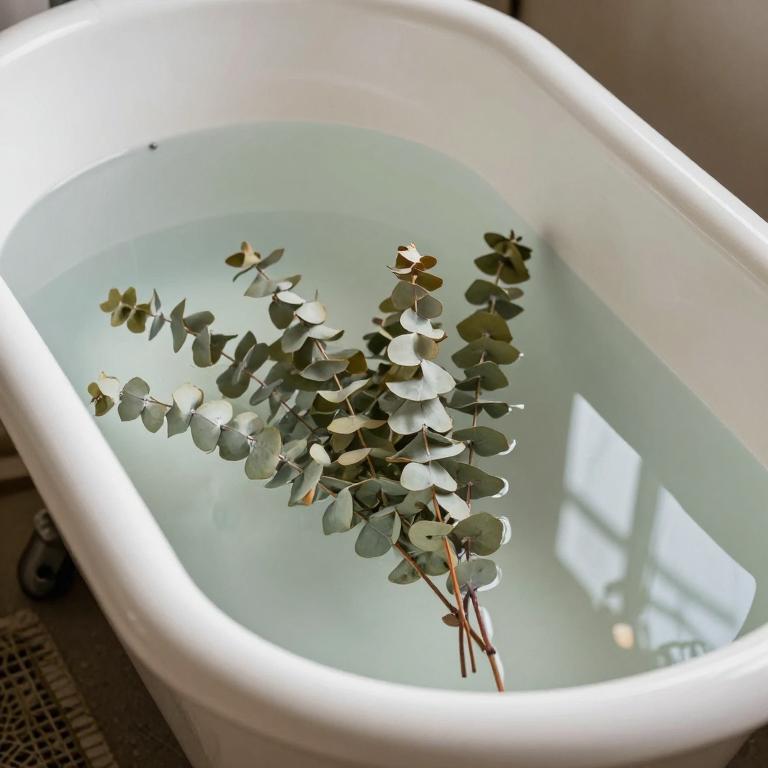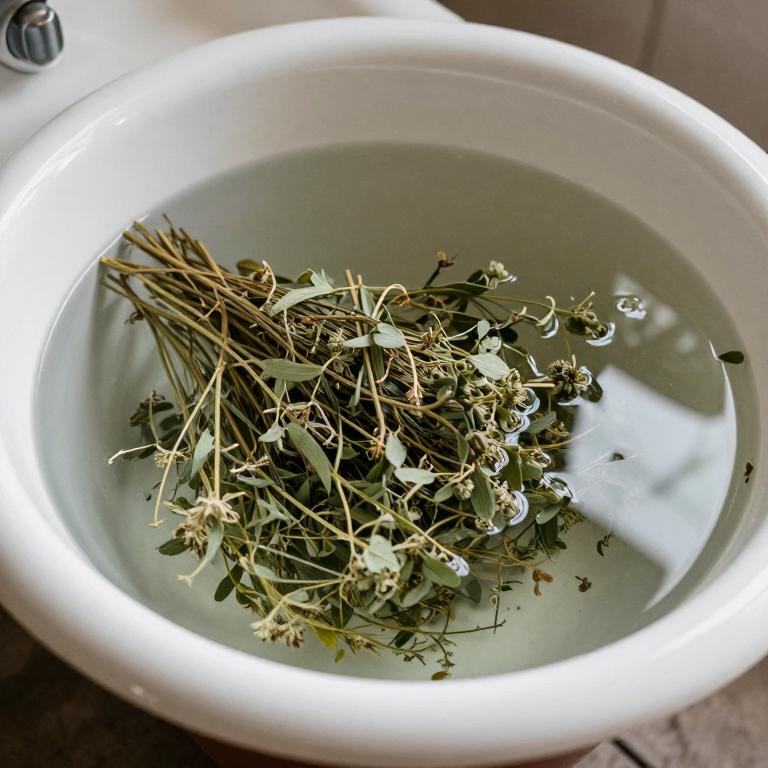10 Best Herbal Baths For Excessive Sweating

Herbal baths can be an effective natural remedy for managing excessive sweating, as certain herbs possess properties that help regulate body temperature and reduce perspiration.
Ingredients like lavender, chamomile, and sage are commonly used in herbal baths due to their calming and antiperspirant effects. Soaking in a warm bath infused with these herbs can help soothe the skin and promote a sense of relaxation, which may indirectly reduce stress-related sweating. Additionally, some herbs have antimicrobial properties that can help prevent skin irritation caused by excessive moisture.
For best results, it is recommended to use these herbs consistently and consult a healthcare professional if excessive sweating persists or is accompanied by other symptoms.
Table of Contents
- 1. Rosemary (Rosmarinus officinalis)
- 2. Salvia (Salvia officinalis)
- 3. Thyme (Thymus vulgaris)
- 4. English lavender (Lavandula angustifolia)
- 5. Field horsetail (Equisetum arvense)
- 6. St. john's wort (Hypericum perforatum)
- 7. Eucalyptus (Eucalyptus globulus)
- 8. Yarrow (Achillea millefolium)
- 9. Ceylon cinnamon (Cinnamomum zeylanicum)
- 10. Lemon balm (Melissa officinalis)
1. Rosemary (Rosmarinus officinalis)

Rosmarinus officinalis, commonly known as rosemary, is a herbal remedy that has been traditionally used to address excessive sweating, or hyperhidrosis.
When incorporated into herbal baths, rosemary's essential oils are believed to have a calming effect on the nervous system, potentially reducing the body's stress response, which can contribute to excessive sweating. The aromatic compounds in rosemary may also help regulate body temperature and improve circulation, supporting the body's natural thermoregulation processes. To use rosemary in a bath, one can add a few drops of rosemary essential oil to a carrier oil or directly to warm water, allowing the soothing scent to permeate the skin.
While herbal baths may offer some relief, they should be used in conjunction with other treatments and under the guidance of a healthcare professional for persistent cases of hyperhidrosis.
2. Salvia (Salvia officinalis)

Salvia officinalis, commonly known as sage, has been traditionally used in herbal baths to help manage excessive sweating, or hyperhidrosis.
The plant contains compounds like rosmarinic acid and thujone, which are believed to have a calming and astringent effect on the skin. When infused into bath water, sage can help regulate body temperature and reduce perspiration by soothing the nervous system. Its antiseptic properties also make it beneficial for preventing skin irritation associated with frequent sweating.
Many people find that incorporating sage into their bath routine provides a natural and effective way to manage sweat-related discomfort.
3. Thyme (Thymus vulgaris)

Thymus vulgaris, commonly known as thyme, has been traditionally used in herbal baths to address excessive sweating due to its antimicrobial and astringent properties.
When infused into bath water, thyme can help reduce sweat production by stimulating the body's natural regulatory mechanisms. The essential oils in thyme, particularly thymol, may help balance the skin's microbiome and reduce inflammation that contributes to hyperhidrosis. Regular use of thyme-infused baths may offer a natural, soothing alternative for those seeking relief from excessive perspiration without harsh chemicals.
However, it is important to consult a healthcare professional before incorporating thyme baths into a treatment regimen, especially for individuals with sensitive skin or underlying health conditions.
4. English lavender (Lavandula angustifolia)

Lavandula angustifolia, commonly known as English lavender, is often used in herbal baths to help manage excessive sweating due to its calming and astringent properties.
When added to warm water, lavender essential oil or dried lavender flowers can soothe the skin and promote relaxation, which may help reduce stress-induced perspiration. The antimicrobial and anti-inflammatory compounds in lavender also support skin health, making it a beneficial addition for those experiencing hot flashes or night sweats. Regular use of lavender-infused baths can provide a natural, aromatherapeutic way to regulate body temperature and improve overall well-being.
However, it is advisable to consult a healthcare professional before using lavender baths, especially for individuals with sensitive skin or certain medical conditions.
5. Field horsetail (Equisetum arvense)

Equisetum arvense, commonly known as field horsetail, has been traditionally used in herbal baths to address excessive sweating due to its high concentration of silica and other minerals that may help regulate bodily functions.
When infused into bath water, the plant's astringent properties are believed to tighten pores and reduce perspiration, offering relief for individuals suffering from hyperhidrosis. The soothing effects of the bath can also promote relaxation and ease the discomfort associated with excessive sweating. However, it is important to use equisetum arvense cautiously, as it contains compounds that may be toxic if ingested in large amounts.
As with any herbal remedy, consulting a healthcare professional before incorporating it into a treatment regimen is advisable.
6. St. john's wort (Hypericum perforatum)

Hypericum perforatum, commonly known as St. John's Wort, has been traditionally used in herbal baths to address excessive sweating, particularly in cases of hyperhidrosis.
The plant contains compounds like hyperforin and hypericin, which are believed to have mild anticholinergic properties that may help regulate sweat production. When infused into bath water, St. John's Wort can create a soothing, calming effect on the skin and may help reduce the frequency and intensity of perspiration. However, it is important to note that this herb can interact with certain medications and should be used with caution, especially in individuals with sensitive skin or those taking antidepressants.
Despite its potential benefits, it is advisable to consult a healthcare professional before incorporating St. John's Wort baths into a treatment regimen for excessive sweating.
7. Eucalyptus (Eucalyptus globulus)

Eucalyptus globulus, commonly known as Australian tea tree, is often used in herbal baths to help manage excessive sweating due to its cooling and antiseptic properties.
When added to warm water, the essential oils from eucalyptus globulus can promote relaxation and help regulate body temperature, which may reduce perspiration. The aromatic compounds in the oil are believed to stimulate the nervous system, potentially balancing sweat production. Regular use of eucalyptus globulus herbal baths can provide a soothing effect while supporting skin health and reducing the discomfort associated with hyperhidrosis.
However, it is important to dilute the oil properly and consult a healthcare professional before use, especially for those with sensitive skin or underlying health conditions.
8. Yarrow (Achillea millefolium)

Achillea millefolium, commonly known as yarrow, has been traditionally used in herbal baths to help manage excessive sweating, particularly in conditions like hyperhidrosis.
The plant contains compounds such as sesquiterpenoids and flavonoids, which are believed to have a calming and astringent effect on the skin and sweat glands. When used in a bath, yarrow can help reduce perspiration by tightening blood vessels and regulating the body's thermoregulatory response. To prepare an herbal bath, steep dried yarrow flowers in hot water for several minutes, then add the infusion to a warm bath.
Regular use of yarrow baths may offer a natural and soothing remedy for individuals seeking relief from excessive sweating without the side effects of conventional treatments.
9. Ceylon cinnamon (Cinnamomum zeylanicum)

Cinnamomum zeylanicum, commonly known as Ceylon cinnamon, has been traditionally used in herbal baths to help manage excessive sweating, or hyperhidrosis.
The aromatic compounds in cinnamon, such as cinnamaldehyde, are believed to have antiseptic and soothing properties that can help regulate body temperature and reduce perspiration. When infused into bath water, cinnamon can promote relaxation and improve circulation, which may help balance sweat production. Its mild warming effect can also help open up pores and detoxify the skin, offering a natural approach to managing sweat-related discomfort.
While not a cure, incorporating cinnamon into herbal baths may provide supportive relief for those experiencing excessive sweating.
10. Lemon balm (Melissa officinalis)

Melissa officinalis, commonly known as lemon balm, is a versatile herbal remedy that has been traditionally used to address excessive sweating, particularly in conditions such as hyperhidrosis.
When incorporated into herbal baths, lemon balm's calming properties can help reduce anxiety and stress, which are common triggers for increased perspiration. The essential oils and phytochemicals present in lemon balm may have mild anticholinergic effects, potentially helping to regulate sweat gland activity. To prepare a lemon balm bath, steep fresh or dried leaves in hot water, then add the infusion to a warm bath for a relaxing soak.
This natural approach offers a soothing and gentle alternative for managing excessive sweating without the side effects often associated with pharmaceutical treatments.